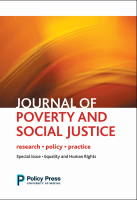
Journal of Poverty and Social Justice
Scope & Guideline
Transforming insights into action for social change.
Introduction
Aims and Scopes
- Interdisciplinary Research on Poverty:
The journal emphasizes the integration of diverse academic disciplines, including sociology, economics, public policy, and social work, to analyze poverty's complex dimensions. - Policy Analysis and Advocacy:
It critically assesses policies related to welfare, social security, and economic justice, providing evidence-based recommendations for improving the lives of marginalized groups. - Social Justice Framework:
Research published in the journal is grounded in social justice principles, focusing on equity, human rights, and the lived experiences of those affected by poverty. - Empirical Studies and Case Analyses:
The journal publishes empirical research, including qualitative and quantitative studies, that examines real-world implications of poverty and social justice initiatives. - Global Perspectives:
It encourages submissions that not only cover local and national contexts but also address global dimensions of poverty, including comparative studies across different countries.
Trending and Emerging
- Food Insecurity and Nutrition:
Recent publications increasingly focus on the intersection of food systems, nutritional disparities, and poverty, highlighting the importance of food security in discussions of social justice. - Universal Basic Income (UBI):
There is a growing interest in exploring UBI as a potential solution to alleviate poverty, with numerous studies evaluating its feasibility and impact across different contexts. - Mental Health and Poverty:
Emerging research examines the nexus between mental health challenges and poverty, recognizing how socioeconomic factors influence mental well-being. - Impact of COVID-19 on Vulnerable Populations:
The journal has seen an increase in studies addressing the effects of the COVID-19 pandemic on poverty and social justice, focusing on the exacerbation of existing inequalities. - Gendered Dimensions of Poverty:
There is a notable rise in research that explores the specific impacts of poverty on different genders, particularly in relation to social policies and economic participation.
Declining or Waning
- Traditional Economic Models of Poverty:
There has been a noticeable decrease in publications centered around traditional economic models and metrics for measuring poverty, suggesting a move towards more qualitative and multidimensional approaches. - Focus on Single-Dimensional Poverty Indicators:
Research concentrating solely on monetary poverty indicators is less prevalent, as the journal increasingly emphasizes multidimensional poverty assessments that consider various factors influencing well-being. - Historical Analyses of Poverty:
While historical perspectives remain important, there appears to be a waning interest in papers that focus exclusively on historical poverty trends, as contemporary issues gain more attention. - Rural Poverty Studies:
Although rural poverty is still relevant, there has been a decrease in the frequency of studies specifically addressing rural poverty issues, possibly overshadowed by urban-centric research themes.
Similar Journals

Journal of Economic Inequality
Bridging disciplines to tackle economic disparities.The Journal of Economic Inequality is a leading interdisciplinary platform dedicated to advancing the understanding of economic disparities and their implications for society. Published by SpringerNature, this journal has achieved an impressive standing within the academic community, featured in the prestigious Q1 quartile across multiple categories, including Economics, Econometrics and Finance, Organizational Behavior and Human Resource Management, and Sociology and Political Science as of 2023. With an emphasis on high-quality empirical research and theoretical contributions, the journal serves as an essential resource for scholars and practitioners alike seeking in-depth insights into the mechanics of inequality. With a broad scope encompassing discussions across various fields, it provides vital perspectives that influence policy-making and social justice. Researchers will find valuable access to cutting-edge studies and the latest trends in economic research, reinforcing the journal's commitment to promoting knowledge that can lead to significant societal change. The journal operates from the Netherlands, with its editorial office located at CAMPUS, 4 CRINAN ST, LONDON N1 9XW, ENGLAND.
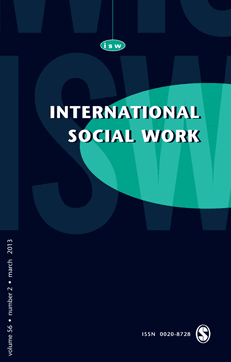
INTERNATIONAL SOCIAL WORK
Fostering Dialogue for a Just WorldINTERNATIONAL SOCIAL WORK, a leading journal published by SAGE PUBLICATIONS LTD, offers an essential platform for disseminating high-quality research and practices in the field of social work and social sciences. With a strong impact factor and a distinguished presence in the Q1 quartile ranking for Social Sciences, Social Work, and Sociology and Political Science, this journal has established itself as a key resource for academics, practitioners, and students alike. The journal welcomes diverse perspectives and innovative approaches to social issues, promoting critical discussions and evidence-based solutions. Since its inception in 1959, INTERNATIONAL SOCIAL WORK has committed to enhancing professional practice and advancing theoretical developments, making it indispensable for anyone dedicated to research and practice in international social work. Readers can access current and past issues, which together reflect the journal's ongoing contribution to the field and its commitment to fostering global dialogue on social justice and welfare.
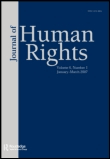
Journal of Human Rights
Exploring the complexities of rights and justice.Journal of Human Rights is a premier academic publication that serves as a vital forum for the discussion and exploration of human rights issues, policies, and legal frameworks. Published by Routledge Journals, Taylor & Francis Ltd in the United Kingdom, the journal boasts a significant impact factor and is classified in the top quartile (Q1) in both Law and Political Science and International Relations, showcasing its high esteem in the field. The journal spans a converged period from 2010 to 2024, illustrating its sustained commitment to addressing contemporary human rights challenges. As researchers and students navigate the complex intersections of law, politics, and sociology, the Journal of Human Rights provides rigorous peer-reviewed articles that contribute to the scholarship and practice of human rights advocacy. Although it operates on a subscription basis without open access, the journal remains highly relevant for academics and professionals seeking to deepen their understanding of human rights dynamics and their implications across various social and political contexts.
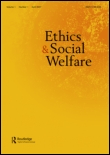
Ethics and Social Welfare
Championing Interdisciplinary Approaches to Social Welfare EthicsEthics and Social Welfare is a premier peer-reviewed journal published by Routledge Journals, Taylor & Francis Ltd, dedicated to advancing the understanding of ethical issues surrounding social welfare practices and policies. With an ISSN of 1749-6535 and an E-ISSN of 1749-6543, this journal serves as a significant platform for interdisciplinary research, bridging the gaps between philosophy, sociology, and political science. Recognized for its rigorous scholarship, it holds an impressive impact ranking within the Q1 category in Philosophy and Q2 in Sociology and Political Science for 2023, showcasing its influence in these fields. The journal aims to explore critical ethical questions and social justice concerns, providing insights that benefit academics, practitioners, and policymakers alike. Although not open access, it ensures a wide reach and disseminates vital knowledge that shapes contemporary discourse in social welfare ethics. Published in the United Kingdom, Ethics and Social Welfare is essential reading for those invested in fostering an equitable society through informed and ethical practices.
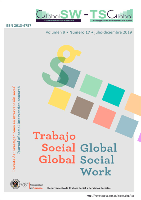
Trabajo Social Global-Global Social Work
Fostering collaboration for a better tomorrow in social work.Trabajo Social Global-Global Social Work is a premier open-access journal published by the University of Granada's Department of Social Work, dedicated to advancing the fields of social work and social welfare on a global scale. With its ISSN 2013-6757 and E-ISSN 2013-6757, this journal has been making significant contributions since its establishment in 2010, emphasizing the importance of accessible research for practitioners, scholars, and students alike. Situated in Granada, Spain, the journal provides a platform for innovative research, critical analyses, and contemporary discussions on global social work practices, policies, and theories. By encouraging collaboration and knowledge exchange among professionals from diverse backgrounds, Trabajo Social Global plays a vital role in shaping social work education and practice around the world. Researchers and practitioners are urged to submit their work to this influential journal, as it continues to foster a deeper understanding of the challenges and opportunities in the field of social work today.

Cogent Social Sciences
Transforming research into accessible knowledge.Cogent Social Sciences is a leading, peer-reviewed open-access journal published by Taylor & Francis AS that serves as a vibrant platform for the dissemination of innovative research across diverse fields within the social sciences. Since its inception in 2015, the journal has been committed to promoting scholarly dialogue and advancing knowledge, offering researchers the opportunity to disseminate their findings quickly and widely. With an impressive Q2 ranking in the category of Social Sciences (miscellaneous) and a ranking of #102 out of 275 in the general social sciences category by Scopus, Cogent Social Sciences stands out in its pursuit of high-quality research. The journal embraces an open-access model, ensuring that published articles are freely accessible to a global audience, thus facilitating broader reach and impact. Researchers, professionals, and students alike are invited to engage with its contents as they explore contemporary issues, theories, and methodologies that shape our understanding of social dynamics.

Alternativas. Cuadernos de Trabajo Social
Driving Change through Open Access ResearchAlternativas. Cuadernos de Trabajo Social, published by Universidad de Alicante, serves as a vital platform for scholarly discourse in the fields of Social Sciences, Sociology, and Health, with a focus on emerging social welfare issues. This Open Access journal has been committed to disseminating vital research since 2010, allowing researchers, professionals, and students from around the globe to access invaluable insights into contemporary social challenges. Based in Spain, it has carved out its niche within the academic landscape, achieving Q4 rankings in Health (Social Science) and Q3 in both Social Sciences (Miscellaneous) and Sociology and Political Science for the year 2023. Although the journal's H-index remains undisclosed, its Scopus rankings indicate a growing presence within the academic community, particularly notable is its rank within the 31st percentile for Sociology and Political Science. As the journal continues to converge its efforts towards innovative social solutions from 2019 to 2024, it remains an essential resource for advancing knowledge and fostering informed debate within the critical sectors it addresses.
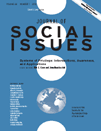
JOURNAL OF SOCIAL ISSUES
Decoding the Complexities of Social IssuesJOURNAL OF SOCIAL ISSUES, published by Wiley, has long been recognized as a cornerstone in the realm of social sciences, aiming to address critical and emerging issues affecting our society. With an impressive impact factor and a Q1 ranking in the field, this journal is positioned as one of the top venues for researchers and scholars, boasting a rank of #6 out of 275 in General Social Sciences, placing it in the 98th percentile. Established in 1945, it continues to provide a platform for rigorous scholarly discourse, focusing on the intersection of social issues and policy-making, psychological dimensions, and community engagement. The journal features a broad scope, appealing to a diverse audience of professionals and students interested in qualitative and quantitative research. Although it is not an open-access publication, readers can access a wealth of invaluable insights and research findings that contribute to the advancement of knowledge and practice in the social sciences. Join a community dedicated to unraveling and critically examining the pressing social issues of our time through the pages of this esteemed journal.
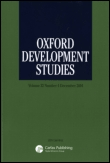
Oxford Development Studies
Transforming Knowledge into Action for Sustainable Development.Oxford Development Studies, published by Routledge Journals, Taylor & Francis Ltd, is a premier academic journal that delves into the dynamic fields of development studies and geography, offering valuable insights and innovative research. With an ISSN of 1360-0818 and an E-ISSN of 1469-9966, the journal has achieved a significant status, being ranked in the Q2 category for both Development and Geography, Planning and Development in 2023. Spanning over several decades, from 1996 to 2024, it provides a critical platform for scholars, practitioners, and students to engage with contemporary issues and policy debates that shape the global development landscape. Notably, it holds a position within the 59th percentile of Scopus rankings for its categories, indicating its substantial influence and contribution to the field. Although it does not currently offer open access, the journal remains accessible to a wide audience through institutional subscriptions. Engaging with the content of Oxford Development Studies is essential for those looking to explore the nexus of research, practice, and policy in development.

SOCIAL INDICATORS RESEARCH
Connecting Empirical Evidence to Everyday LifeSOCIAL INDICATORS RESEARCH is a prominent peer-reviewed journal published by SPRINGER, focused on delivering high-quality research within the fields of social sciences, including sociology, political science, and developmental psychology. With a history spanning from 1974 to 2024, this journal has established itself as a vital resource for scholars interested in the multifaceted aspects of social indicators, quality of life, and measurement of subjective well-being. The journal boasts an impressive Q1 quartile ranking in Arts and Humanities, Social Sciences, and Sociology, reflecting its influence and reputation within these domains. Despite operating under a traditional subscription model, it ensures accessibility to a wide audience through its comprehensive studies and findings. The journal continuously aims to bridge the gap between empirical research and practical applications, making it an essential read for researchers, professionals, and students seeking to advance their understanding of social phenomena and indicators.